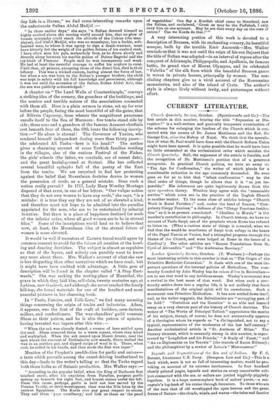CURRENT LITERATURE.
Church Quarterly Review, October. (Spottiswoode and Co.)—The first article in this number, bearing the title "Expansion or Dis- ruption?" is a well-written and generally temperate examination of the scheme for enlarging the borders of the Church which is con- nected with the names of Dr. James Martineau and the Rev. Sir George Cox, alias the Bishop of Natal. We think that the specula- tion of what St. Paul would have done with the Church Reform Union might have been spared. It is quite possible that he would have been no little astonished at the ecclesiastical order which satisfies the Church Quarterly. Still, the argument of the article is forcible, and the recognition of Dr. Martinean's position that of a generous antagonist. In practical Church politics, we have an essay on "The Age for Confirmation," the writer of which pleads for a considerable reduction in the age commonly demanded. He even goes so far as to hint that "infant confirmation" may be the ideal order of things, though he allows that it is "as yet im- possible." His inferences are quite legitimately drawn from the opus operatum theory. Whether they agree with the "reasonable service" which some see in the practice of the English Church is another matter. To the same class of articles belongs "Church Work in Rural Parishes ;" and, under the head of finance, "Compulsory Clergy Pensions," a defence of the "Clergy Pensions Institu- tion" as it is at present constituted. "Idealism in Morals" is the number's contribution to philosophy. In Church history, we have an account of 'Paolo Sarpi, one of the prophets whom Rome has refused to listen to. (What a carious state of things is revealed, when we find that the would-be murderers of Sarpi took refoge in the house of the Papal Nancio at Venice, had a triumphal progress through the States of the Church, and were lodged at Rome in the house of a Cardinal !) The other articles are "Recent Translations from St. Cyril of Alexandria" and "The A.mbrosian Breviary."


































 Previous page
Previous page